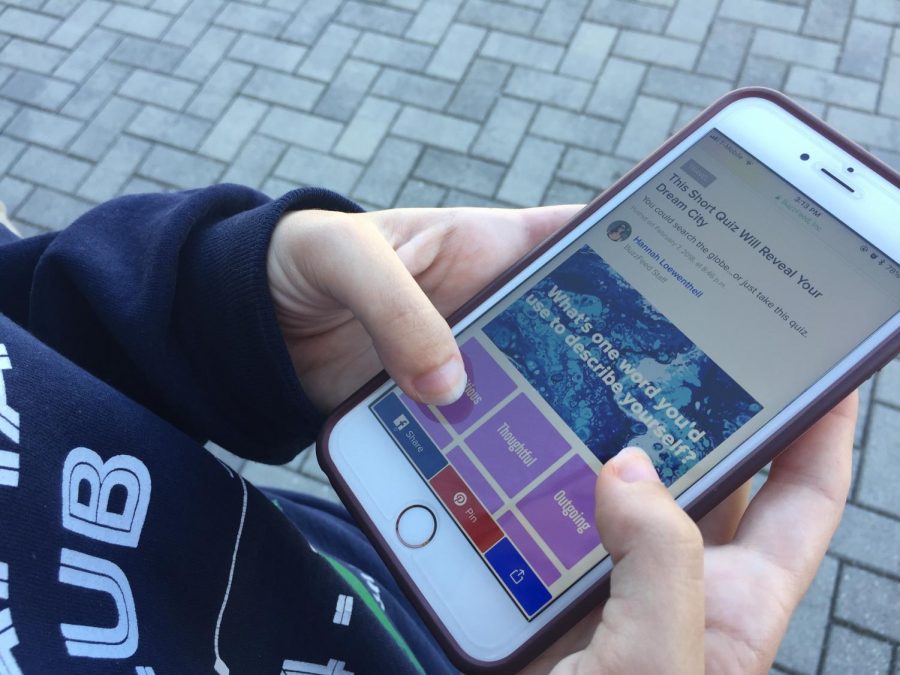Are Internet Companies Stealing Your Information? Take The Quiz to Find Out!
February 9, 2018
People that sign up to take part of online quizzes do not know that they are actually signing up for something much more sinister. Something that has children and teens alike is that they are constantly searching up some websites for their strange and random quizzes that are used to mainly kill time. With titles such as We’ll Find Out Your Age From Your Favorite Type Of Cheese, people do not expect these websites to be that much of a threat to their security; However, the flashy questions and wacky answers are simply a diversion, something to distract you from the real plan, that these multi-million dollar masterminds have set in motion. These site are snakes in the grass, waiting patiently until their audience turns a blind eye, so they can turn on them. The secret that they are hiding is that these platforms are actually fishing websites, used to register the information you put into their system and presenting you an advertisement that “coincidentally” suits all of your preferences. The consumer buying the item, without a second thought, leaves the culprit to slick back into the shadows, successfully catching another victim.
News Outlet Claims
According to an article published by BBC, “Few people probably realize that, every time they install one of these apps, they continue running in the background unless users actively delete them via their privacy settings.” This implies that adding in apps that include quizzes, like Buzzfeed or Facebook, are still active even in the times when you are not on them, potentially collecting your data when you don’t even know it.
The same article mentions Paul Bischoff, a freelance journalist who had wrote a piece for Comparitech with the name That “most used words” Facebook quiz is a privacy nightmare. This pointed out the large amount of data required to take a simple quiz, such as name, age, and everything posted on your Facebook timeline. Without knowledge of the people providing these quizzes for you, how can you know that you can trust them with your private information? Here is the dilemma, you do not. You are willing you give strangers the right to look into your privacy for the sake of knowing things that should not matter with your real life.
Of course, there are companies that defend their quizzes such as Vonvon, a South Korean company that created the quiz that centered Paul’s article, with the chief executive Jonghwa Kim claiming to BBC,”We only use your information to generate your results, and we never store it for other purposes.” If companies are denying the accusations that they use your information for other purposes, are there any other possible suspects that we need to look out for? It seems that in searching for dirt that we could pin on big-scale companies, we forgot to turn to a threat just as relevant: hackers.
In a story highlighted by NBC news, an interview with Sri Sridharan of the Florida Center of Cybersecurity had him state,”The more they know about you the more ways they can trick you into doing something. Like clicking on a link you should not click on.” The “they” that he is referring to are internet hackers, people who disguise quizzes to steal your information for their own personal benefit. They cheat and manipulate their way right through the system to get to their goal: your wallet. Before you even know it your credit card information is compromised and you feel ashamed for choosing to trust a “harmless” quiz.
Let’s ask our students
I decided to look into this further and interview students on what they noticed when taking quizzes. “My favorite quizzes to take are the types of quizzes that describe how intelligent you are, they are fun to do in my free time” said 11th grader Holly Sutton. “I have noticed ads on the quizzes I take, but they are mainly only for companies or other quizzes on the website” added high schooler Shayna Lefrak. Both students seemed to have a large perception into what web page their quiz was on, both recognizing advertisements being displayed in the sidelines. However, this begs the question, if the quiz was to casually ask them a question regarding their personal information, would they insert it without a second thought? “Well it depends on how personal the question is,” stated Lefrak, “If it was something general like age or gender then I would insert the information, but if it went to the point of asking for my real name I wouldn’t consider putting it in.”
Online quizzes have to be one of the most interesting parts of the internet. Hundreds of people per day log into an account just to answer questions to get answers that in the next 30 minutes they would probably forget. However, this could be the chance for someone to take advantage of its users. In just a few questions, someone can be manipulated into making a decision they could learn to regret. Our private information is called private for a reason, so do not let the curiosity these quizzes induce in us blind our common sense.













Karen Fishman • Feb 22, 2018 at 9:48 PM
Well said! Thank you for bringing up and covering a subject I didn’t think about much BUT I WILL NOW! Very informative!!